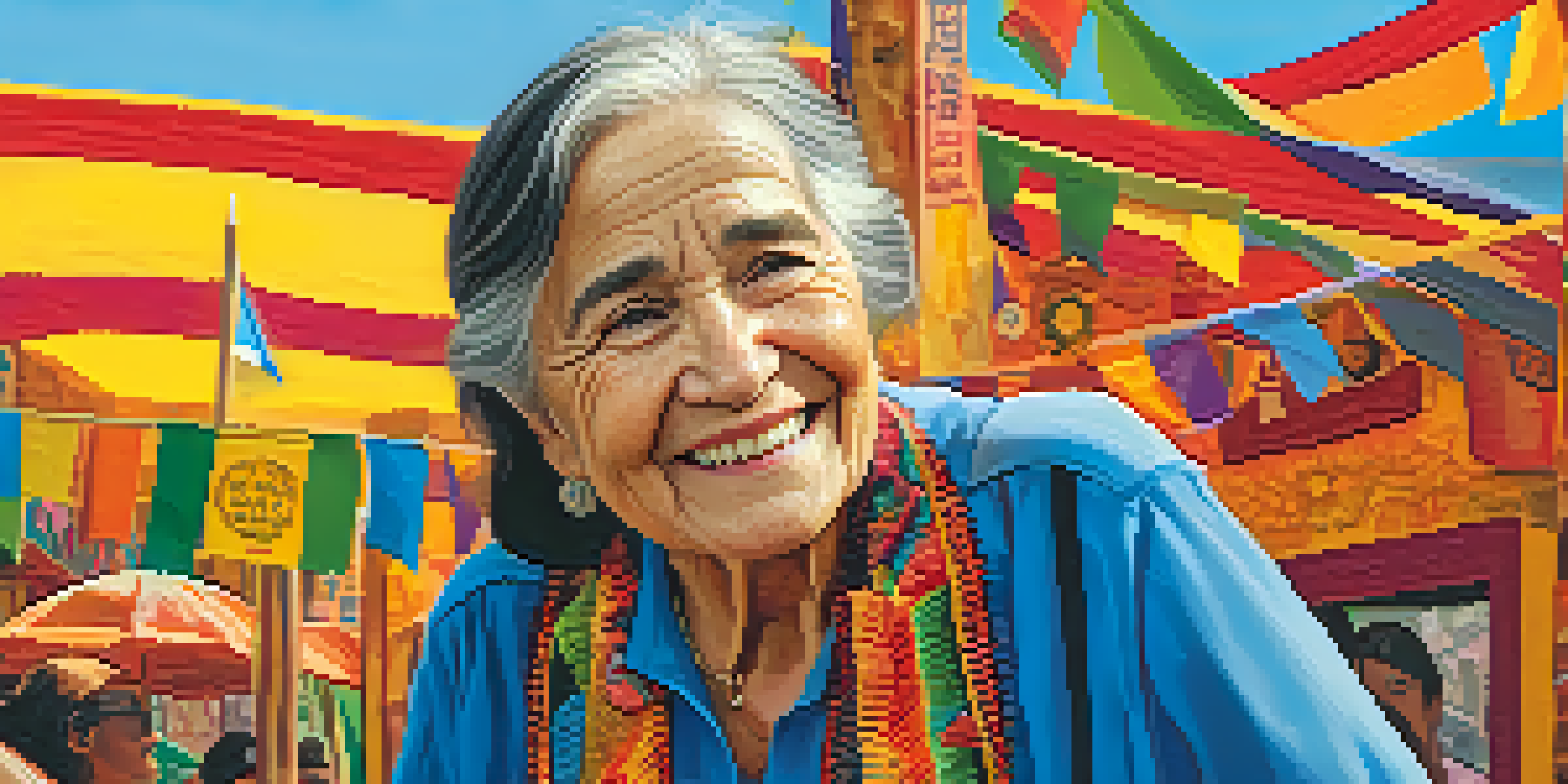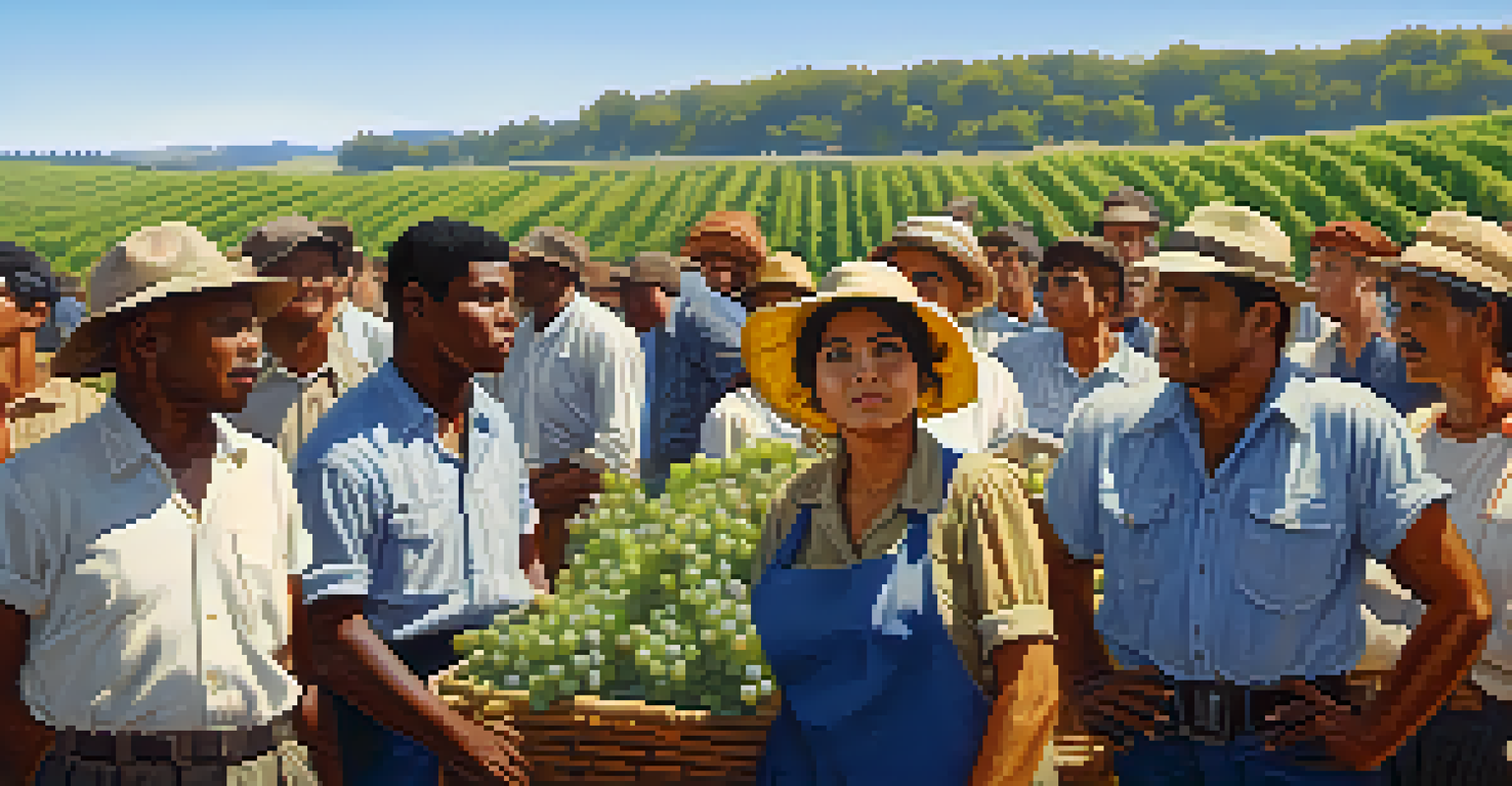Dolores Huerta: Co-Founder of the United Farm Workers

Early Life and Influences on Dolores Huerta
Dolores Huerta was born on April 10, 1930, in Dawson, New Mexico. Growing up in a family that faced economic hardships, she learned the value of hard work and resilience early on. Her mother, a strong advocate for social justice, played a pivotal role in shaping Dolores's views on equality and civil rights.
The future belongs to those who believe in the beauty of their dreams.
After moving to California, Huerta witnessed the struggles of farm workers firsthand. This experience ignited her passion for activism, motivating her to fight for workers' rights. She often recalls how these formative experiences fueled her desire to create change and uplift the marginalized.
These early influences laid the groundwork for Huerta’s future endeavors in labor rights and activism. The combination of her upbringing and experiences ultimately propelled her into a life dedicated to social justice.
Co-founding the United Farm Workers Union
In 1962, Dolores Huerta co-founded the United Farm Workers (UFW) alongside Cesar Chavez. Their partnership was rooted in a shared vision of improving working conditions for agricultural laborers. Together, they faced immense challenges, including opposition from powerful agricultural businesses.

Huerta served as the UFW's chief negotiator, demonstrating her exceptional skills in advocacy and negotiation. She was instrumental in organizing strikes and boycotts, gathering national attention for the plight of farm workers. Her relentless dedication helped to solidify the UFW's place in labor history.
Huerta's Early Life Shaped Activism
Dolores Huerta's upbringing in a struggling family and her mother's advocacy for social justice inspired her lifelong commitment to labor rights and equality.
The UFW's formation marked a significant turning point in labor rights, showcasing how grassroots organizing can lead to impactful change. Huerta's leadership and tenacity were crucial in transforming the lives of countless farm workers across the nation.
Key Achievements of Dolores Huerta
Dolores Huerta's contributions to labor rights extend beyond the UFW's founding. She played a vital role in the Delano grape strike of 1965, which lasted for five years and drew national support. This strike was pivotal in raising awareness about the poor conditions faced by farm workers.
We must use our lives to make the world a better place for all who live in it.
In 1970, Huerta helped negotiate the first-ever union contract for California grape workers, establishing better wages and working conditions. This landmark achievement was a testament to her negotiation skills and unwavering commitment to justice.
Her work has earned her numerous accolades, including the Eleanor Roosevelt Award for Human Rights. Huerta's achievements not only transformed the agricultural labor landscape but also inspired future generations of activists.
Advocacy Beyond Farm Workers' Rights
While Huerta is primarily known for her work with farm workers, her advocacy spans various social justice issues. She has been a staunch supporter of women's rights, education, and immigration reform. Her commitment to these causes reflects her belief in intersectionality within social justice movements.
Huerta has also worked closely with the Democratic Party, advocating for policies that benefit marginalized communities. Her voice has resonated in political spheres, pushing for legislative changes that address systemic inequalities.
Key Achievements in Labor Rights
Huerta's negotiation skills were crucial in establishing the first union contract for California grape workers, significantly improving their wages and working conditions.
Through her advocacy, Huerta emphasizes the importance of unity among diverse groups. She believes that collective action is essential for achieving long-lasting change, a principle that continues to guide her work.
Legacy and Impact on Future Generations
Dolores Huerta's legacy is felt not only in the labor movement but also in the hearts of aspiring activists. She has inspired countless individuals to take up the mantle of social justice and fight for their rights. Many young activists cite her as a mentor, demonstrating her lasting influence.
Her famous phrase, 'Sí, se puede' ('Yes, it can be done'), has become a rallying cry for those seeking change. This simple yet powerful message encapsulates her belief in the potential for success through perseverance and collective action.
Huerta's work continues to inspire new movements, proving that the fight for justice is far from over. Her legacy serves as a reminder that each generation carries the responsibility to advocate for equity and justice.
Recognition and Awards for Huerta's Work
Over her lifetime, Dolores Huerta has received numerous awards and honors recognizing her contributions to social justice. In 2012, she was awarded the Presidential Medal of Freedom, one of the highest civilian honors in the United States. This accolade acknowledged her tireless advocacy and impact on labor rights.
In addition to national recognition, Huerta has been celebrated by various organizations and institutions. Schools and community centers across the country have been named after her, ensuring that her legacy lives on in the communities she fought to uplift.
Legacy Inspires Future Activists
Huerta's enduring legacy and famous phrase 'Sí, se puede' motivate new generations to continue the fight for social justice and equality.
These awards not only honor her past achievements but also reinforce the ongoing relevance of her work. They serve as a testament to the enduring spirit of activism that Huerta embodies.
Continuing the Fight: Huerta's Current Work
Even in her 90s, Dolores Huerta remains an active advocate for social justice. She travels across the country, speaking to young activists and sharing her experiences. Her energy and passion continue to inspire others to engage in the ongoing fight for equality.
Huerta is also involved in various initiatives aimed at empowering the next generation of leaders. Through her foundation, she supports educational programs that focus on social justice and community activism. Her dedication to mentorship is evident in her desire to equip young people with the tools they need to create change.

In a world still grappling with social injustices, Huerta's work is more important than ever. She embodies resilience and hope, reminding us that the struggle for justice is a collective journey.